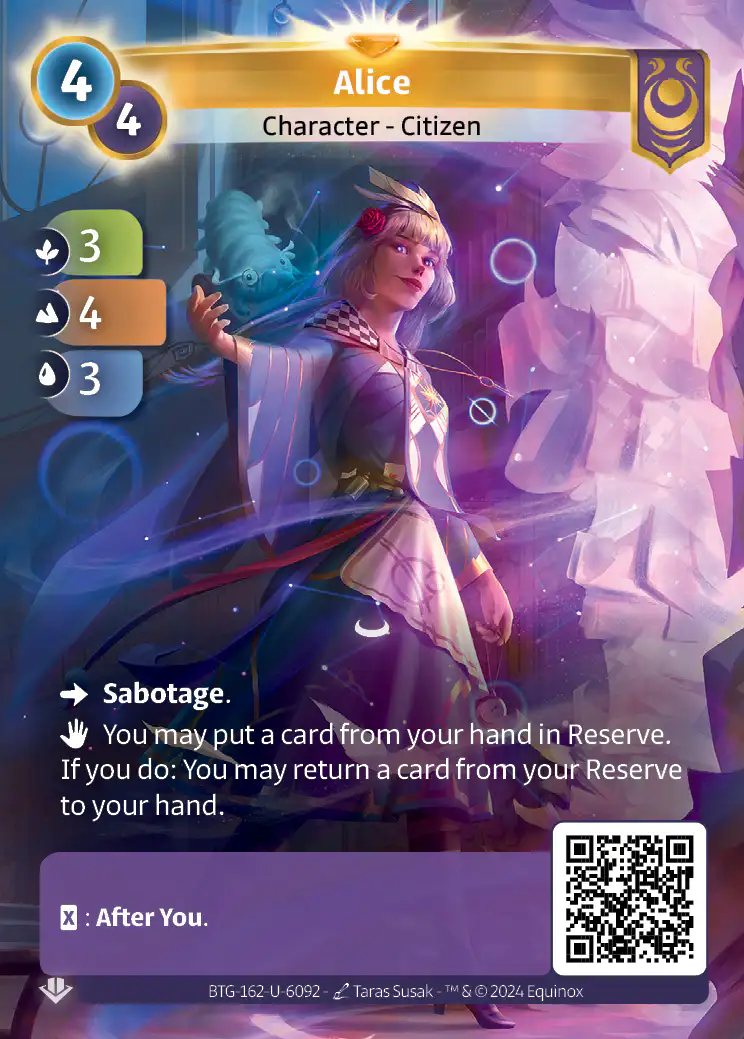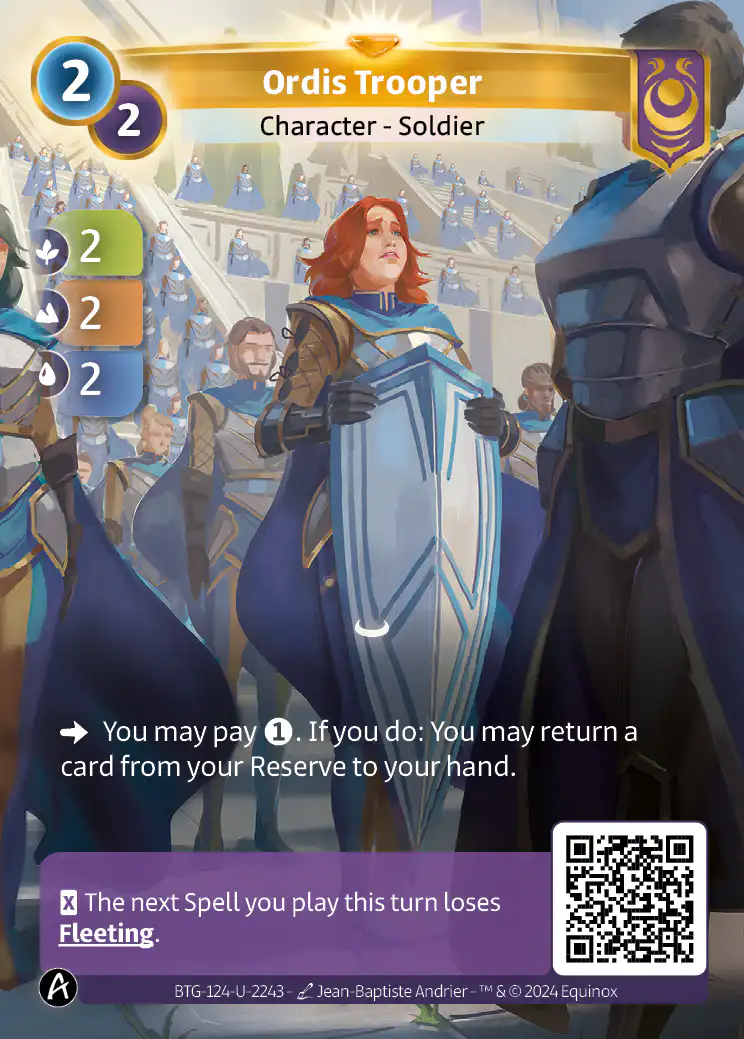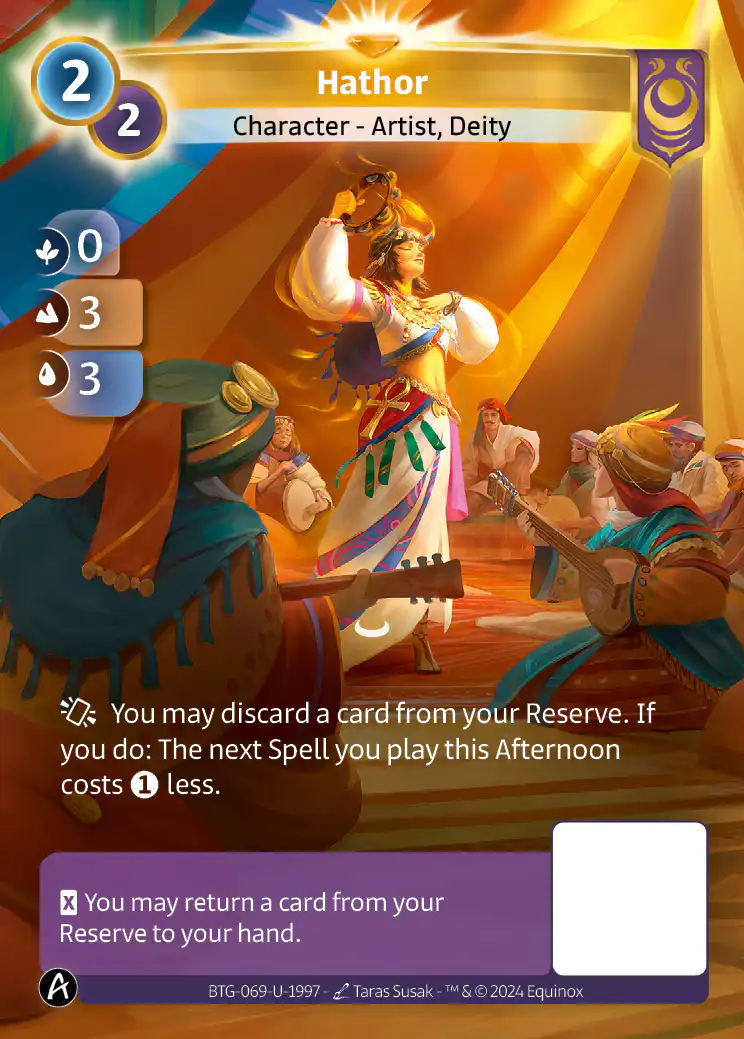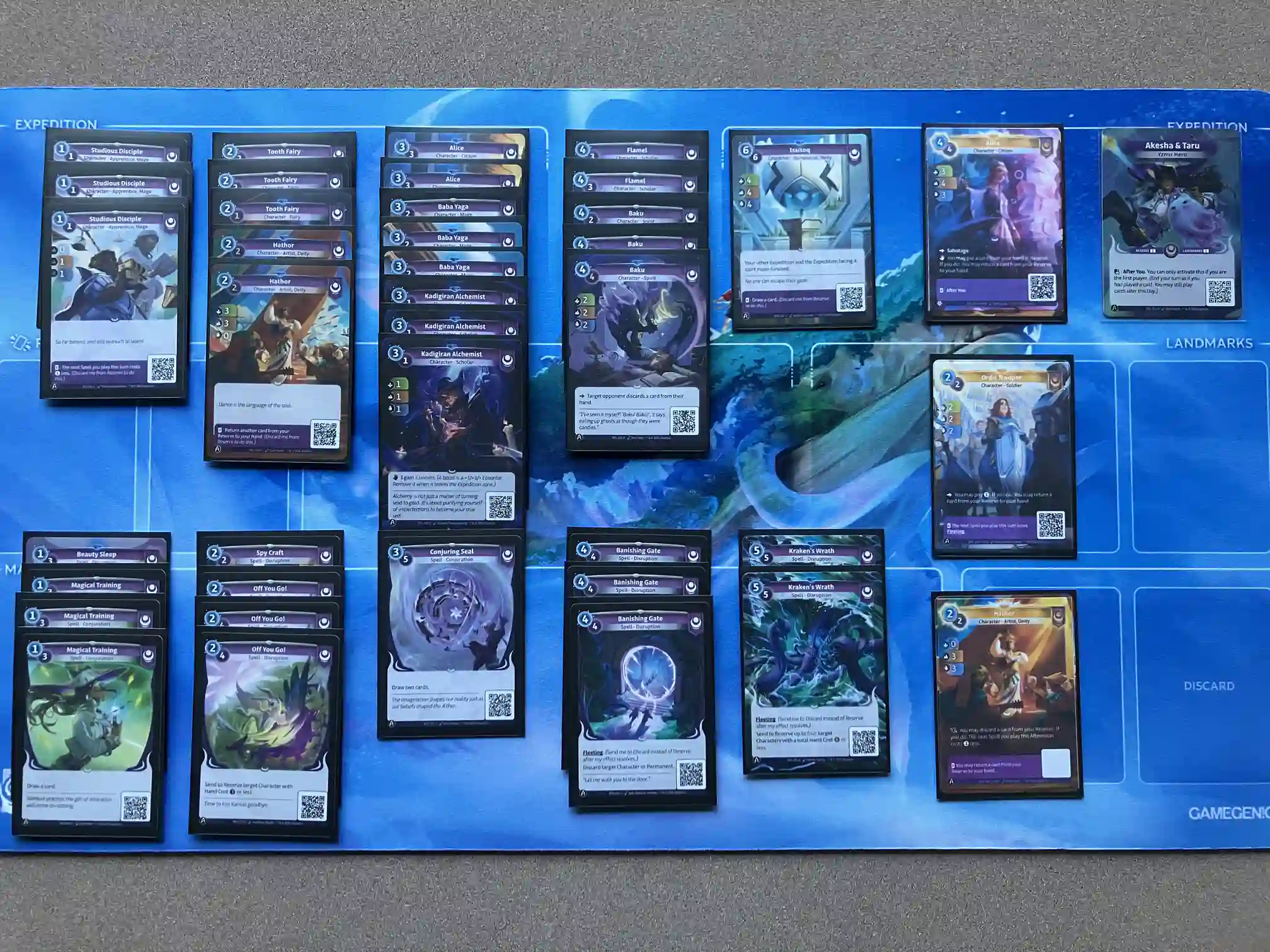I brought Akesha & Taru to the Monday A.W.O.L. weekly where I went 1-4 (after a first-round bye) for 30th out of 46. The deck feels solid despite today’s disappointing performance, which I attribute to playing against strong players and getting a couple of tough matchups.
The deck
This an attrition-style control deck that plays for the long game by gradually running your opponent out of resources.
Large 3-drops alongside Akesha’s after-you ensure that you can trade in the early-game at worst, threatening to go 1-0 if your opponent can’t contest both expeditions.
In the mid-game, your hero ability forces your opponent to overextend on resources or else risk your plays beating theirs once they pass. The luxury of passing priority is that any mana you don’t need to spend to contest expeditions can be used to draw cards or sabotage your opponent’s.
By the late-game, you’ll ideally be able to leverage your resource advantage to slow-roll your opponent then answer their strongest plays with removal spells.
If your opponent ever goes low on cards - either as a result of you chipping away at their resources or the game naturally going long - you can drop a Baku to leave them unable to spend their mana. This can be a win condition of its own, as you can often go 2-0 while they forgo mana-ing in order to recover on the following turn.
Card choices
Cards included
- Kadigiran Alchemist (R): The bump in stats really matters. Akesha likes a 1-mana 1-1-1 enough for the purpose of passing priority that it’s worth incentivizing you to play the front side.
- Alice (R): Fills a similar role as Kadigiran Alchemist (R).
- Baku: Baku is game-winning if it hits your opponent’s last card but does next to nothing if they’re able to draw before the Baku comes down. Not playing Small Step, Giant Leap (C) frees up slots for this as a situational card that usually goes into mana but you’ll want to see when the moment is right.
- Banishing Gate (C): I started with two copies but quickly added the third. If your opponent plays The Spindle, Muna Bastion (C), Brassbug Hive (R), The Monolith, Ordis Bastion (C), etc., you need to have this in hand to not lose on the spot.
- Kraken’s Wrath (R): The rare’s extra reach is meaningful against Sigismar, your worst matchup, where sweeping up an additional token can be the difference between winning and losing. Akesha’s built-in after-you helps you make the most out of removal. I enjoy playing this card, but it’s possible Akesha is better off spending the rare slot elsewhere.
- Hathor (F): The support ability is great to bounce Magical Training (C) and Off You Go! (C), but I’ve actually ended up playing it from reserve for its stats more often since the deck is light on well-statted 2-drops.
- Beauty Sleep (F): I went down to one copy after noticing I was putting this into mana more often than I would have liked when I drew it early. This isn’t a tempo deck that tries to win with Small Step, Giant Leap (C), so there are more situations where sleeping something means you’ll just have to deal with it later.
- Conjuring Seal (C): This should probably be something else, but every once in a while I’d find myself in a position where 3 mana wouldn’t make a difference on board, and it was nice to convert this into two cards.
Cards excluded
- Small Step, Giant Leap (C): I tend to run fewer copies of this than the average Yzmir player, but I’d still argue that the card isn’t a good fit for this deck: the typical gameplan is to win through resource advantage, so if you’re at a position where this card would win you the game, you can usually close things out the hard way. This being a dead draw at all other points is very bad when the deck has so many other situational cards like Baku, Banishing Gate, and Kraken’s Wrath.
- Tooth Fairy (R): I’m at one copy of the rare but this is probably where I’d put more rare slots if I had them.
- Spy Craft (C): It’s possible I should be running more copies, but I was worried it might leave me light on plays to the board.
Uniques

Alice: 5/7
I don’t love a sabotager costing 4, since you usually want to sabotage early, but tapping out for this lets your opponent know exactly what they need to beat you.
That said, an arrow sabotage ability can really wear down your opponent’s resources, and you’re not giving up too many stats to do so. The swap ability almost always lets you upgrade to a better card from reserve. Sometimes, you can even put a fleeting spell in reserve to minimize the downside, or put an Issitoq (F) in reserve to cycle it for free.

Ordis Trooper: 5/7
I’ve found that most uniques with an optional mana cost are overcosted when you’re not using their ability and, as a result, don’t actually offer the flexibility they advertise. This is one of the few exceptions.
For Yzmir, where returning a card from reserve is often comparable to card draw, a 3-mana 2/2/2 that does this will put you far ahead on resources if you can find a safe window to play it. Even if you can’t, it can at least be played as a 2-mana 2/2/2. This makes it a nice fit for Akesha, whose after-you often lets her know how the expeditions will shake out so that she can play it in the mode that best fits the situation.

Hathor: 4/7
This is effectively a third, region-shifted copy of the rare, but Akesha likes Hathor (F) enough that I’m always happy to play it.
Takeaways
Kraken’s Wrath (R) didn’t look great today:
- keeping it in R2 over Hathor (F) put me behind by two expeditions
- it weighed down my opening hand in R3
- it would have won R5, but Grand Endeavor (R) made it useless
- I didn’t need it to win R6
There was no point today where I would have preferred Small Step, Giant Leap (C) to another card in hand.
Quetzalcóatl (R) is a brutal counter to Magical Training in the early-game. Make sure to keep it in mind when deciding on your opening hand against Waru.
The games
Round 1 (B)
My opponent wasn’t online, so I received the win by default.
Round 2 (L): Sigismar & Wingspan
Alice (R) let me trade against a Jian, Assembly Overseer (U) on D1. On D2, her after-you support ability gave me a window to use a Baku (C) to trade while knocking an Ordis Spy (C) out of my opponent’s hand.
On D3, I had to decide between keeping Hathor (F) or a Kraken’s Wrath (R). I went for the Kraken’s Wrath given how strong it is late-game in this matchup. My decision felt worse after my Magical Training (C) drew into the other Kraken’s Wrath (R), leaving me light on playable cards.
Meanwhile, my opponent shrugged off the Baku discard by drawing from a Baba Yaga (R) and both sides of an Ozma (C).
Kadigiran Alchemist (R) costing 1 from reserve let me slow-play an Issitoq (F) to go 1-0 and pull into the lead at 2/3.
My opponent was way up on cards by this point and had drawn into an Amelia Earhart (U) that creates a token whenever another non-token character joins. I spent an Off You Go! (C) to limit the damage it could do after they replayed it.

Hathor (F) would have flipped the hero side if I had kept it back on D3 instead of Kraken's Wrath (R).
When Magical Training (C) drew dead into a Baku (R), I came to regret my keep of Kraken’s Wrath (R) over Hathor (F). My only play was to forfeit both expeditions and draw up with Magical Training from reserve.

This position made Kraken's Wrath (R) and Baku (R) feel like poor uses of rare slots.
With my opponent at 1/2, I was unable to block them on both sides. Notably, if the Tooth Fairy (C) had been the rare, I would have been able to pass priority once more for a much stronger Kraken Wrath (R).
Round 3 (L): Waru & Mack

My keep got punished by a D1 Quetzalcóatl (R), but I'm not sure there was a better option. Marks against the late-game cards on the right.
My opponent’s Quetzalcóatl (R) as the starting player demolished my planned D1 of Magical Training (C) + Studious Discple (C). Magical Training (C) would give them a free progression, so I settled for just playing the Studious Disciple and passing. This was especially painful because the other card I had kept in my opening hand was Flamel (C) to recur the Magical Training on the following turn.
My opponent’s Ozma (C) drew them a card, and their Ordis Attorney (R) disincentivized me from winning an expedition with a Kadigiran Alchemist (R). I went 1-0 on the following turn, but triggered my opponent’s two Ordis Attorney (R)s, and I had to begrudgingly rule out the possibility of starving my opponent of resources.

Not seeing an Off You Go! (C) all game meant that Banishing Gate (C) was the only way I could disrupt their bureaucrats.
My opponent was happy to concede one expedition to resleep their Quetzalcóatl (R) on the following turn. We were still tied on expeditions at that point, but I took an 0-2 to Banishing Gate (C) their second Quetzalcóatl (R) and leave them without a slept bureaucrat.
Behind on both expeditions and resources, my opponent was able to pass priority against my hand of 3-cost characters and win the game with a Teamwork Training (C).
Round 4 (L): Teija & Nauraa
The modality of my Ordis Trooper (U) felt great in the opening hand. I felt comfortable keeping it as the only character alongside two critical spells - Magical Training (C) and Banishing Gate (C) - since I knew I could win an expedition with it if Magical Training didn’t draw me into a character.
Flamel (C) let me stay even on expeditions while accumulating card advantage. For the first time, I spent the Ordis Trooper (U)’s support ability to remove fleeting from a Banishing Gate (C). This was critical, letting me discard my opponent’s anchored Dracaena (C), prevent a progression, and save the Banishing Gate (C) for a Hydracaena or The Spindle, Muna Bastion.

Loki (F) landed a three-card swing for my opponent and left me with a much worse hand.
I felt great at this point, massively ahead on cards. Unfortunately, my opponent’s Tiny Jinn (F) had ramped them to 7 mana, which let them drop Loki (F) ahead of schedule as the first player. This discarded my four-card hand and my opponent one-card hand, resulting a three-card swing.
I misplayed here, completely overlooking the fact that my reserve Flamel (C) and newly drawn Alice (R) could have gone 1-0 against their boosted Loki.
Drawing into all three copies of Off You Go! (C) didn’t help. I only had one character, an Alice (R), so I felt pressured to send to reserve their boosted Spindle Harvesters (C) and Sneezer Shroom (C) just to ensure they didn’t have enough mana to win the uncontested expedition and beat my Alice.
Now that I was low on cards, my opponent was able to pass priority against me to go 1-0 with a Mana Reaping (C).

Instantly removing the Dracaena (C) instead of using Akesha's after-you would have turned off Lyra Thespian (F) or similar uniques.
On the final turn, I used my hero ability instead of instantly removing a previously-anchored Dracaena (C), which gave my opponent the chance to trigger an Ordis Gatekeeper (U) that draws a card if you control two or more boosted characters. This turned off my Baku (R), and they were able to 1-0 for the win by playing out their hand.
Round 5 (L): Sigismar & Wingspan
I traded with Alice (R) on D1. Unfortunately, moving into exactly a mountain-only region let me opponent play Ozma (C) alongside two 1-drops on the following turn to 1-0 me while drawing.
I drew into a Banishing Gate (C) here and held onto it. If my opponent was on The Monolith, Ordis Bastion (C) or Grand Endeavor (R), I couldn’t afford to not have removal for it when it came down.
My Spy Craft (C) to sabotage Ozma (C) meant the attrition gameplan was still a possibility for the time being. My opponent’s cleverly made it look like they were overcommitting hero-side, then played The Sandman (F) to bank a 3/3/3 Ordis Recruit on their winning side for the following turn. Fortunately, Hathor (F)’s large mountain stats helped guarantee that I could at least trade expeditions.
My opponent starting the afternoon with 4/4/4 on their hero side pressured me into playing Flamel (C) into a water-only region despite my only other characters being two Hathor (F)s. I was able to block their forest-mountain region just fine but still went 0-1, falling further behind.
My opponent put all their characters hero-side try to guarantee at least one progression. We traded both this turn and following, but they expended more resources than I did. Kadigiran Alchemist (R)’s extra stats were critical here.
We were at 3/1 on expeditions, but they only had two cards in hand and a Monolith Rune-Scribe (R) in reserve. My Tooth Fairy (C) sabotaged their Rune-Scribe, leaving me confident that Kraken’s Wrath (R) could 2-0 from here.

Kraken's Wrath (R) would have won in this spot against anything except card draw or Grand Endeavor (R).
Unfortunately, my opponent’s last card in hand was a Grand Endeavor (R) when they needed just one more progression to win. I had a reserve Baba Yaga (R) to block and Banishing Gate (C) to deal with the Grand Endeavor, but at only 7 mana, I was 1 mana short of the 8 I needed to do both.
Had I been holding on a Baku here, I could have gone 1-0 at worst while sniping the Grand Endeavor (my opponent could have run out the Grand Endeavor immediately, but then they wouldn’t have been able to sabotage my reserve Kadigiran Alchemist (R), which would have let me block both sides).
Round 6 (W): Treyst & Rossum
I took the risk of holding onto Baku (C) from the opener, since this is a matchup you can win by starving Treyst of resources.

This is as good of a Baku window as I'm going to get.
On D2, my opponent led with Amelia Earhart (C), and I decided this was my best window to Baku (C). I played it opposite Amelia Earhart, figuring my opponent would need to keep exactly a 1-drop in hand to 2-0 me, otherwise they could at best go 1-0. Even if they did have the 1-drop, going 2-0 would require them to start the next turn with an empty hand and only that 1-drop in reserve.
My opponent ended up discarding a Foundry Mechanic (C) to Baku in order to hold onto their Ada Lovelace (R).
I drew into another Baku (R) next turn. This time, playing it opened me up to going 0-2 but hit the last card in their hand, an Axiom Salvager (R). My opponent 2-0’d me by playing the last two cards in their reserve. This turned on their hero ability and gave them a free card in reserve, but I was okay with this since I had a Tooth Fairy (C) in hand to sabotage it as the starting player next turn.

Two Baku discards meant my opponent had no choice but to put their Haven (F) into reserve with Treyst, waiting to be sabotaged.
I was thrilled when they drew and had to put a Haven, Bravos Bastion (F) into reserve. I sabotaged it first thing next turn.
My opponent put an Ada Lovelace (R) directly into reserve with Treyst’s hero ability. Unfortunately for them, the card they put into reserve with Ada was an Armored Jammer (C). This meant my reserve Baku (R) could safely discard the last card in their hand, a Tinker Bell (C). Since my opponent had 4 mana but no plays to the board, I was able to 2-0.
With the Baku (R) face-up in reserve, I think it would have been better if my opponent had stayed at 5 mana in order to keep both cards in hand.
I was able to 1-0 again on the following turn. The turn after, Alice (U) sabotaged their only card in reserve and swapped a Banishing Gate (C) in hand for an Alice (R) from reserve. Alice (R)’s 4 in water helped me secure another 1-0.
My opponent was starting to recover on cards and finally drew into a replacement Haven, but being ahead on expeditions, I was able to trade, then win on the following turn with Beauty Sleep (F).
